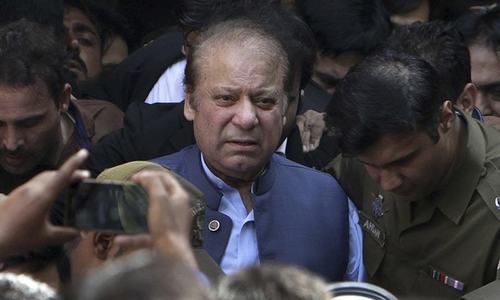LAHORE: Days after the UK Home Department refused to extend former prime minister Nawaz Sharif’s stay in the country on medical grounds, his ‘fresh’ medical report was submitted to the Lahore High Court here on Wednesday pleading that he “cannot return as doctors have not yet allowed him air travel”.
This is the 11th medical report of Nawaz Sharif submitted to the LHC since he left the country in November 2019 for his treatment. In all medical reports, a similar plea had been taken that ‘doctors have stopped him (Nawaz) from air travel’.
PML-N President Shehbaz Sharif has already ruled out the return of the party supremo to the country until his ‘full recovery’, asserting that he can legally stay in the UK till the British immigration tribunal decides his appeal against the home department’s refusal to extend his visa.
Nawaz’s counsel Advocate Amjad Pervaiz submitted the three-page report (to court) which was prepared and signed by his (Nawaz’s) consultant cardiothoracic surgeon David Lawrance.
Consultant advises ex-PM against travel due to ‘health complications’
In the latest medical report, Lawrance said: “Nawaz Sharif, undoubtedly, has complex and complicated medical issues which need to be treated holistically. Great care needs to be exercised in dealing with each of the diseases and comorbidities he is suffering in order to maintain the right balance. He has been looked after by an experienced hematology team led by a senior hematologist at the Guy’s and St. Thomas Hospital and the cardiologists at the Royal Brompton and Hare field Hospital, London. Prior to this latest referral Mr Nawaz had been getting treatment here in London for many years.”
The doctor said: “There is also the appearance of the transient ischemic dilatation suggesting significant ischemic burden that amounts approximately 22 per cent of the myocardium. This is indicative of significantly reduced blood supply to the heart in the circumflex territory and impaired functionality. Mr Nawaz is advised cardiac catheterisation and subsequent management given the significant risk of worsening of his heart disease but once his comorbidities (ITP, hypertension, diabetes and chronic kidney disease) were stabilised by a multidisciplinary approach.”
“He developed ITP during his incarceration and his response to the first and second line therapies was unsatisfactory, a stable platelet count within the medically prescribed range, was paramount to ensure the safety of diagnostics and treatment. In addition to the recent finding of him having developed carotid artery’s stenosis, he was assessed to have had an exacerbation of his coronary artery disease and deterioration of renal functions. The intention was indeed to proceed with the management of his cardiac and carotid diseases once he was given clearance from haematology and nephrology specialties.”
Surgeon Lawrance further said Mr Nawaz was advised to “eat healthy, exercise regularly and manage his stress to the maximum extent possible in order not to have a negative bearing on his health.”
“Nawaz Sharif told me that he was kept in solitary confinement for a prolonged period of time during his imprisonment in Pakistan. If this were true, I share his concern that this could have contributed negatively towards his health, both physically and psychologically. During the Covid crisis he was managed medically and was under surveillance and follow up for his persistent symptoms. He should now proceed with his coronary angiography and possible angioplasty,” Lawrance said and added that it was his opinion regarding Mr Nawaz’s travel to Pakistan and its implications on his health remained the same as reiterated in my earlier medical reports.
“He should by all means avoid travelling and visiting public places like airports. He should only stay in close proximity to the healthcare facilities where he has been getting his treatment until the Covid-19 threat is over and his health problems are adequately addressed,” Lawrance said and added the facilities in the UK provided the best of care as is important to address his complex health issues.
“Mr Nawaz needs to take serious precaution being a clinically extremely vulnerable person.”
Prior to the departure of Nawaz to London, Shehbaz had submitted an undertaking to the LHC that he would ensure the return of his elder brother “within four weeks or on certification by doctors that he has regained his health and is fit to return to Pakistan”. Nawaz was allowed to leave the country for four weeks, extendable on the basis of medical reports.
Nawaz was serving seven-year imprisonment at the Kot Lakhpat jail in the Al-Azizia corruption case before his departure to London.
Last week Nawaz had filed an appeal in the British Immigration Tribunal challenging the decision of the home department to refuse extension to his visa on medical grounds.
Published in Dawn, August 12th, 2021














































